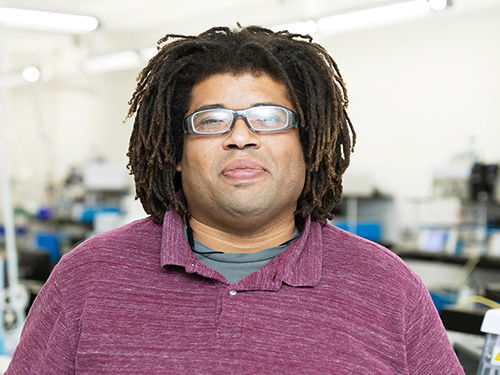Featured Customer – Donald Johnson, Ph.D.

Given the right mindset and support, a curse can turn into a blessing. This month’s featured customer, Dr. Don Johnson, started life with disadvantages but did not give up - he built on his experiences of adversity and helping hands to become a successful scientist, while also finding time to support youth in need of mentorship and support. It’s our pleasure to have him aboard as a customer and member of the extended Wyatt family.
Please tell us about your background: where you grew up, what you studied and the field you chose.
I am originally from Houston, TX. I was homeschooled by my mother as I was always in the hospital being treated for osteosarcoma and traveling to the Mayo Clinic in Rochester, MN. My mother retired when I was 9 years old and we moved to a very rural area north of Houston (Huntsville, TX). I eventually got better, ended up in a classroom and graduated in 2004 from the Chinquapin School, which is a boarding school directed to serving economically disadvantaged and underrepresented minorities. I went on to Occidental College, where I majored in Chemistry. Following Occidental, I ended up at the NIH (NHGRI and NIBIB), where I worked with George Patterson on developing photoactivatable fluorescent proteins for super resolution microscopy.
George Patterson was instrumental in my decision to continue my education in Chemistry. I went on to obtain my M.S. and Ph.D. at UCSD from the Ellisman lab, where we developed techniques for improving resolution of Serial Blockface Scanning Electron Microscopy. I went on to work for Vali Nanomedical, developing multi-lamellar liposomes. I carried that interest over to ChromoLogic, where I led the development of a drug delivery group to treat moderate to severe traumatic brain injury.
What led you to choose those fields? What are the challenges that excite you?
I was drawn to science because of my childhood experiences of constantly living in a hospital. It was my 11th grade chemistry course in high school that really solidified my interest in chemistry. My high school professor actually ended up developing a set of additional course work and even an additional “elective” course to satisfy my interest in chemistry. I looked for opportunity to expand my knowledge of chemistry and was always supported while at Chinquapin.
I am currently in the position of Scientist at Bristol Myers Squibb. I was drawn to the drug development field based on my childhood experiences which inspired me to contribute to curing cancer and other disease.
How have your Wyatt instruments contributed to your research and development studies?
I currently work with a number of Wyatt light scattering instruments to study novel combinations of materials. A fairly unique feature of Wyatt Technology is Light Scattering University (LSU). LSU was useful in solidifying our abilities to troubleshoot and set up methods for some of the more challenging materials. We attend the user meetings, where we are able to discuss any additional questions that have not yet been sent to Wyatt Support.
Wyatt’s Applications and Customer Support staff has been very helpful in onboarding our team with these instruments. We have shared data sets with the applications scientists who have helped set up processing and analysis pipelines that are specific to our characterization needs. Of the various vendors from who we have purchased instrumentation, Wyatt has stood out as being very technically engaged to ensure our success.
Any personal anecdotes that would help illuminate your career, interests, connection to Wyatt or outlook for the readers?
As a black man and scientist, I have always found my field to contain a limited representation of people like me. I spend my time daily, making sure my unique perspective is represented within team discussions, and I mentor students at UCSD and Chinquapin to pay it forward and help other underrepresented minorities and women see that it is possible to consider science as a career.

Wyatt's Applications and Customer Support staff have been very helpful in onboarding our team with our instruments and stand out as being technologically engaged to ensure our success.
